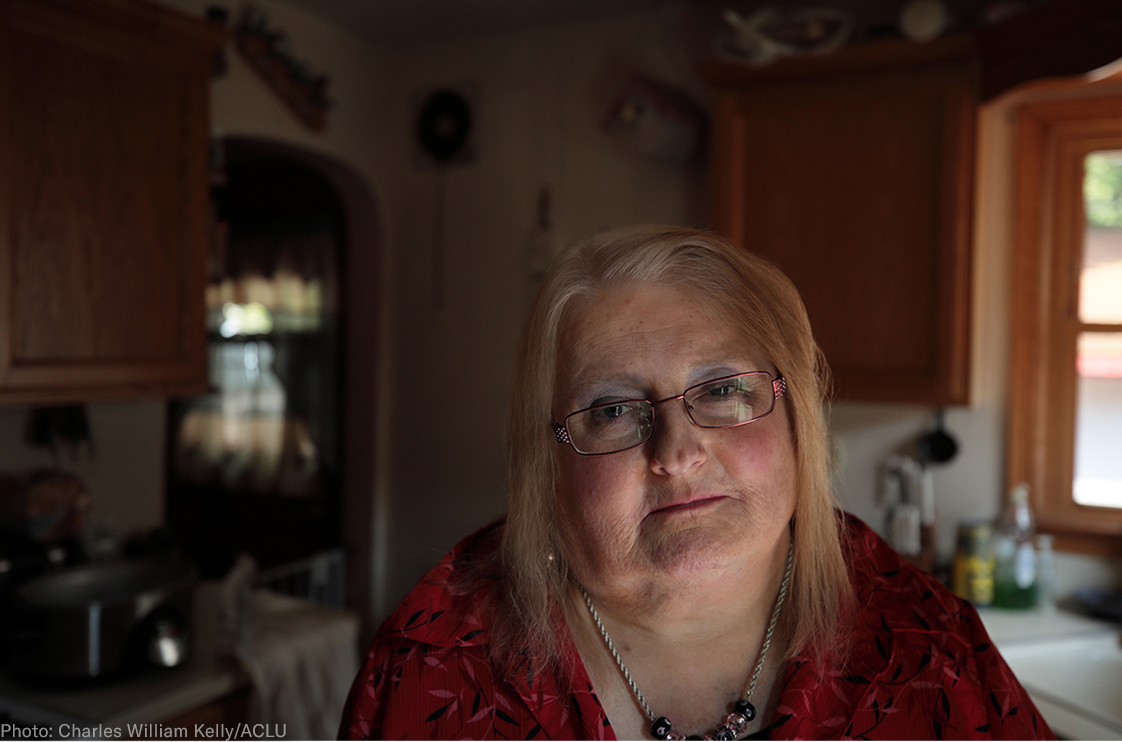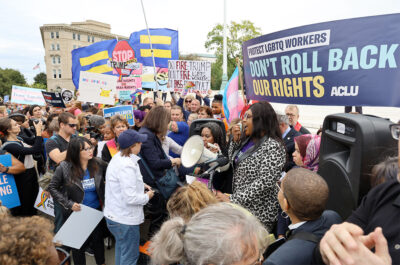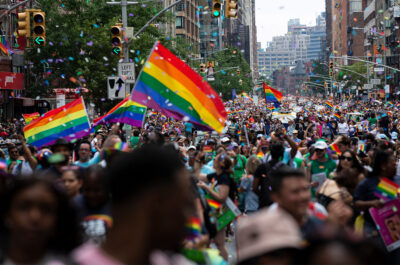
LGBTQ Discrimination Cases at the Supreme Court
What's at Stake
In Bostock v. Clayton County, the Supreme Court ruled that anti-LGBTQ discrimination violates the federal law against discrimination in the workplace.
Summary
The Bostock case consisted of three cases that were argued at the same time. The ACLU was counsel in two of the cases:
- R.G. & G.R. Harris Funeral Homes v. EEOC (Aimee Stephens)
- Altitude Express v. Zarda (Donald Zarda)
In the third case, Bostock v. Clayton County, Gerald Bostock was represented by private counsel.
Aimee Stephens
Aimee Stephens worked as a funeral director at R.G. & G.R. Harris Funeral Homes. When she informed the funeral home’s owner that she is transgender and planned to come to work as the woman she is, the business owner fired her, saying it would be "unacceptable" for her to appear and behave as a woman.
Don Zarda
Donald Zarda, a skydiving instructor, was fired from his job because of his sexual orientation. A federal trial court rejected his discrimination claim, saying that the Civil Rights Act does not protect him from losing his job for being a gay man. Tragically, in October 2014, Zarda died unexpectedly, but the case continues on behalf of his estate.
Gerald Bostock
Gerald Lynn Bostock was fired from his job as a county child welfare services coordinator when his employer learned he is gay. In May 2018, the Eleventh Circuit Court of Appeals refused to reconsider a 1979 decision wrongly excluding sexual orientation discrimination from coverage under Title VII’s ban on sex discrimination, and denied his appeal.
Legal Documents
-
07/03/2019
21 States and DC -
07/03/2019
206 Businesses -
07/03/2019
84 Cities, Counties, and Mayors -
07/03/2019
AFL-CIO -
07/03/2019
Altria Group, Inc. -
07/03/2019
American Bar Association -
07/03/2019
American Medical Association, et al. -
07/03/2019
American Psychological Association -
07/03/2019
Anti-Discrimination Scholars -
07/03/2019
Anti-Sexual Assault, Domestic Violence, and Gender-Based Violence Organizations -
07/03/2019
Employment Discrimination Law Scholars -
07/02/2019
Equal Means Equal, et al. -
07/03/2019
Former Chairs and Commissioners of the EEOC and Other Former Executive Branch Officials -
07/03/2019
Former Solicitors General, et al. -
07/03/2019
Georgia Equality -
07/03/2019
GLBTQ Advocates & Defenders, National Center for Lesbian Rights, et al. -
07/03/2019
Historians of Sexuality, Gender, and Law -
07/03/2019
Impact Fund, National Employment Lawyers Association, et al. -
07/03/2019
interACT: Advocates for Intersex Youth, et al. -
06/27/2019
Karl Olson -
07/03/2019
Kenneth B. Mehlman, et al. -
07/03/2019
Lambda Legal Defense and Education Fund, Inc. in Support of Aimee Stephens -
07/03/2019
Lambda Legal Defense and Education Fund, Inc. in Support of Bostock and Zarda -
07/03/2019
Law and History Scholars -
07/03/2019
Lawyers’ Committee for Civil Rights Under Law, The Leadership Conference on Civil and Human Rights, et al. -
07/03/2019
Legal Aid Society of New York -
07/03/2019
LGBTQ+ Members of the Legal Profession -
07/03/2019
Linguists -
07/03/2019
Members of Congress -
07/03/2019
Modern Military Association of America -
07/03/2019
Muslim Organizations -
07/03/2019
National Education Association, et al. -
07/03/2019
National LGBT Bar Association, et al. -
07/03/2019
National Women's Law Center, et al. -
07/03/2019
Philosophers -
07/03/2019
Professors Samuel Bagenstos, Michael C. Dorf, Martin S. Lederman, Leah M. Litman, and Margo Schlanger -
07/03/2019
Professors William Eskridge Jr. and Andrew Koppelman -
07/03/2019
Religious Organizations and Faith Leaders -
07/03/2019
SEIU -
07/03/2019
Small Business Organizations -
07/03/2019
Southern Poverty Law Center, et al. -
07/03/2019
Statutory Interpretation and Equality Law Scholars -
07/03/2019
Transgender Law Center, Center for Constitutional Rights, et al. -
07/02/2019
Transgender Legal Defense & Education Fund, et al. -
07/03/2019
Trevor Project, PFLAG, and Family Equality Council -
07/03/2019
Williams Institute in Support of Aimee Stephens -
07/03/2019
Williams Institute in Support of Bostock and Zarda -
07/03/2019
Wisconsin Advocacy Organizations -
07/03/2019
Women CEOs and Other C-Suite Executives
Date Filed: 07/03/2019
Court: Amicus Briefs in Support of Employees
Download DocumentDate Filed: 07/03/2019
Court: Amicus Briefs in Support of Employees
Download DocumentDate Filed: 07/03/2019
Court: Amicus Briefs in Support of Employees
Download DocumentDate Filed: 07/03/2019
Court: Amicus Briefs in Support of Employees
Download DocumentDate Filed: 07/03/2019
Court: Amicus Briefs in Support of Employees
Download DocumentDate Filed: 07/03/2019
Court: Amicus Briefs in Support of Employees
Download DocumentDate Filed: 07/03/2019
Court: Amicus Briefs in Support of Employees
Download DocumentDate Filed: 07/03/2019
Court: Amicus Briefs in Support of Employees
Download DocumentDate Filed: 07/03/2019
Court: Amicus Briefs in Support of Employees
Download DocumentDate Filed: 07/03/2019
Court: Amicus Briefs in Support of Employees
Download DocumentDate Filed: 07/03/2019
Court: Amicus Briefs in Support of Employees
Download DocumentDate Filed: 07/02/2019
Court: Amicus Briefs in Support of Employees
Download DocumentDate Filed: 07/03/2019
Court: Amicus Briefs in Support of Employees
Download DocumentDate Filed: 07/03/2019
Court: Amicus Briefs in Support of Employees
Download DocumentDate Filed: 07/03/2019
Court: Amicus Briefs in Support of Employees
Download DocumentDate Filed: 07/03/2019
Court: Amicus Briefs in Support of Employees
Download DocumentDate Filed: 07/03/2019
Court: Amicus Briefs in Support of Employees
Download DocumentDate Filed: 07/03/2019
Court: Amicus Briefs in Support of Employees
Download DocumentDate Filed: 07/03/2019
Court: Amicus Briefs in Support of Employees
Download DocumentDate Filed: 06/27/2019
Court: Amicus Briefs in Support of Employees
Download DocumentDate Filed: 07/03/2019
Court: Amicus Briefs in Support of Employees
Download DocumentDate Filed: 07/03/2019
Court: Amicus Briefs in Support of Employees
Download DocumentDate Filed: 07/03/2019
Court: Amicus Briefs in Support of Employees
Download DocumentDate Filed: 07/03/2019
Court: Amicus Briefs in Support of Employees
Download DocumentDate Filed: 07/03/2019
Court: Amicus Briefs in Support of Employees
Download DocumentDate Filed: 07/03/2019
Court: Amicus Briefs in Support of Employees
Download DocumentDate Filed: 07/03/2019
Court: Amicus Briefs in Support of Employees
Download DocumentDate Filed: 07/03/2019
Court: Amicus Briefs in Support of Employees
Download DocumentDate Filed: 07/03/2019
Court: Amicus Briefs in Support of Employees
Download DocumentDate Filed: 07/03/2019
Court: Amicus Briefs in Support of Employees
Download DocumentDate Filed: 07/03/2019
Court: Amicus Briefs in Support of Employees
Download DocumentDate Filed: 07/03/2019
Court: Amicus Briefs in Support of Employees
Download DocumentDate Filed: 07/03/2019
Court: Amicus Briefs in Support of Employees
Download DocumentDate Filed: 07/03/2019
Court: Amicus Briefs in Support of Employees
Download DocumentDate Filed: 07/03/2019
Court: Amicus Briefs in Support of Employees
Download DocumentDate Filed: 07/03/2019
Court: Amicus Briefs in Support of Employees
Download DocumentDate Filed: 07/03/2019
Court: Amicus Briefs in Support of Employees
Download DocumentDate Filed: 07/03/2019
Court: Amicus Briefs in Support of Employees
Download DocumentDate Filed: 07/03/2019
Court: Amicus Briefs in Support of Employees
Download DocumentDate Filed: 07/03/2019
Court: Amicus Briefs in Support of Employees
Download DocumentDate Filed: 07/03/2019
Court: Amicus Briefs in Support of Employees
Download DocumentDate Filed: 07/03/2019
Court: Amicus Briefs in Support of Employees
Download DocumentDate Filed: 07/03/2019
Court: Amicus Briefs in Support of Employees
Download DocumentDate Filed: 07/02/2019
Court: Amicus Briefs in Support of Employees
Download DocumentDate Filed: 07/03/2019
Court: Amicus Briefs in Support of Employees
Download DocumentDate Filed: 07/03/2019
Court: Amicus Briefs in Support of Employees
Download DocumentDate Filed: 07/03/2019
Court: Amicus Briefs in Support of Employees
Download DocumentDate Filed: 07/03/2019
Court: Amicus Briefs in Support of Employees
Download DocumentDate Filed: 07/03/2019
Court: Amicus Briefs in Support of Employees
Download Document-
08/23/2019
15 States -
08/21/2019
Advocates for Faith & Freedom -
08/23/2019
American Public Philosophy Institute -
08/22/2019
Billy Graham Evangelistic Association -
08/25/2019
Business Organizations -
08/23/2019
Council for Christian Colleges & Universities -
08/20/2019
Center for Arizona Policy -
08/23/2019
Christian Employers Alliance -
08/23/2019
Family Policy Groups -
08/23/2019
David A. Robinson -
08/20/2019
Defend My Privacy -
08/23/2019
Dr. Paul McHugh, M.D. -
08/20/2019
First Liberty Institute -
08/23/2019
Former Secretary of Education William J. Bennett -
08/16/2019
Foundation for Moral Law -
08/22/2019
Free Speech Advocates -
08/21/2019
Great Lakes Justice Center -
08/20/2019
H.T. Hackney Company -
08/20/2019
Independent Women's Forum -
08/23/2019
Institute for Faith and Family -
08/23/2019
Judicial Watch -
08/23/2019
Liberty Counsel (Bostock and Zarda) -
08/23/2019
Liberty Counsel (Stephens) -
08/23/2019
Marriage Law Foundation -
08/23/2019
Members of Congress -
08/23/2019
Military Spouses United -
08/23/2019
Muslim American Leaders -
08/23/2019
National Association of Evangelicals -
08/22/2019
National Medical and Policy Groups That Study Sex and Gender Identity -
08/20/2019
National Organization for Marriage -
08/22/2019
New Civil Liberties Alliance -
08/23/2019
Public Advocate of the United States et al. -
08/23/2019
Religious Freedom Institute, Islam and Religious Freedom Action Team, et al. -
08/21/2019
Ryan T Anderson -
08/23/2019
Scholars of Family and Sexuality -
08/23/2019
Scholars of Philosophy, Theology, Law, Politics, History, Literature, and the Sciences -
08/23/2019
United States -
08/23/2019
United States Conference of Catholic Bishops (Bostock and Zarda) -
08/23/2019
United States Conference of Catholic Bishops (Stephens) -
08/23/2019
Walt Heyer et al. -
08/20/2019
Women's Liberation Front -
08/22/2019
W. Burlette Carter -
08/23/2019
Women Business Owners and CEOs
Date Filed: 08/23/2019
Court: Amicus Briefs in Support of Employers
Download DocumentDate Filed: 08/21/2019
Court: Amicus Briefs in Support of Employers
Download DocumentDate Filed: 08/23/2019
Court: Amicus Briefs in Support of Employers
Download DocumentDate Filed: 08/22/2019
Court: Amicus Briefs in Support of Employers
Download DocumentDate Filed: 08/25/2019
Court: Amicus Briefs in Support of Employers
Download DocumentDate Filed: 08/23/2019
Court: Amicus Briefs in Support of Employers
Download DocumentDate Filed: 08/20/2019
Court: Amicus Briefs in Support of Employers
Download DocumentDate Filed: 08/23/2019
Court: Amicus Briefs in Support of Employers
Download DocumentDate Filed: 08/23/2019
Court: Amicus Briefs in Support of Employers
Download DocumentDate Filed: 08/23/2019
Court: Amicus Briefs in Support of Employers
Download DocumentDate Filed: 08/20/2019
Court: Amicus Briefs in Support of Employers
Download DocumentDate Filed: 08/23/2019
Court: Amicus Briefs in Support of Employers
Download DocumentDate Filed: 08/20/2019
Court: Amicus Briefs in Support of Employers
Download DocumentDate Filed: 08/23/2019
Court: Amicus Briefs in Support of Employers
Download DocumentDate Filed: 08/16/2019
Court: Amicus Briefs in Support of Employers
Download DocumentDate Filed: 08/22/2019
Court: Amicus Briefs in Support of Employers
Download DocumentDate Filed: 08/21/2019
Court: Amicus Briefs in Support of Employers
Download DocumentDate Filed: 08/20/2019
Court: Amicus Briefs in Support of Employers
Download DocumentDate Filed: 08/20/2019
Court: Amicus Briefs in Support of Employers
Download DocumentDate Filed: 08/23/2019
Court: Amicus Briefs in Support of Employers
Download DocumentDate Filed: 08/23/2019
Court: Amicus Briefs in Support of Employers
Download DocumentDate Filed: 08/23/2019
Court: Amicus Briefs in Support of Employers
Download DocumentDate Filed: 08/23/2019
Court: Amicus Briefs in Support of Employers
Download DocumentDate Filed: 08/23/2019
Court: Amicus Briefs in Support of Employers
Download DocumentDate Filed: 08/23/2019
Court: Amicus Briefs in Support of Employers
Download DocumentDate Filed: 08/23/2019
Court: Amicus Briefs in Support of Employers
Download DocumentDate Filed: 08/23/2019
Court: Amicus Briefs in Support of Employers
Download DocumentDate Filed: 08/23/2019
Court: Amicus Briefs in Support of Employers
Download DocumentDate Filed: 08/22/2019
Court: Amicus Briefs in Support of Employers
Download DocumentDate Filed: 08/20/2019
Court: Amicus Briefs in Support of Employers
Download DocumentDate Filed: 08/22/2019
Court: Amicus Briefs in Support of Employers
Download DocumentDate Filed: 08/23/2019
Court: Amicus Briefs in Support of Employers
Download DocumentDate Filed: 08/23/2019
Court: Amicus Briefs in Support of Employers
Download DocumentDate Filed: 08/21/2019
Court: Amicus Briefs in Support of Employers
Download DocumentDate Filed: 08/23/2019
Court: Amicus Briefs in Support of Employers
Download DocumentDate Filed: 08/23/2019
Court: Amicus Briefs in Support of Employers
Download DocumentDate Filed: 08/23/2019
Court: Amicus Briefs in Support of Employers
Download DocumentDate Filed: 08/23/2019
Court: Amicus Briefs in Support of Employers
Download DocumentDate Filed: 08/23/2019
Court: Amicus Briefs in Support of Employers
Download DocumentDate Filed: 08/23/2019
Court: Amicus Briefs in Support of Employers
Download DocumentDate Filed: 08/20/2019
Court: Amicus Briefs in Support of Employers
Download DocumentDate Filed: 08/22/2019
Court: Amicus Briefs in Support of Employers
Download DocumentDate Filed: 08/23/2019
Court: Amicus Briefs in Support of Employers
Download Document-
06/15/2020
Bostock v. Clayton County: Supreme Court Opinion
Date Filed: 06/15/2020
Download DocumentPress Releases
Supreme Court Urged Not to Roll Back Workplace Protections for LGBTQ People

